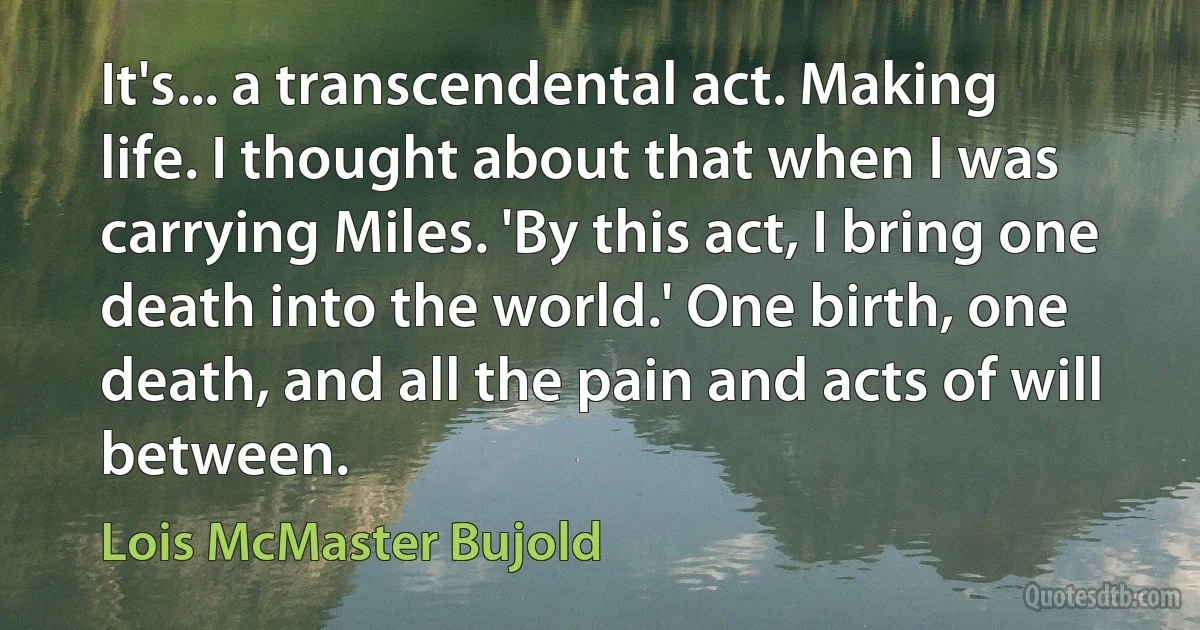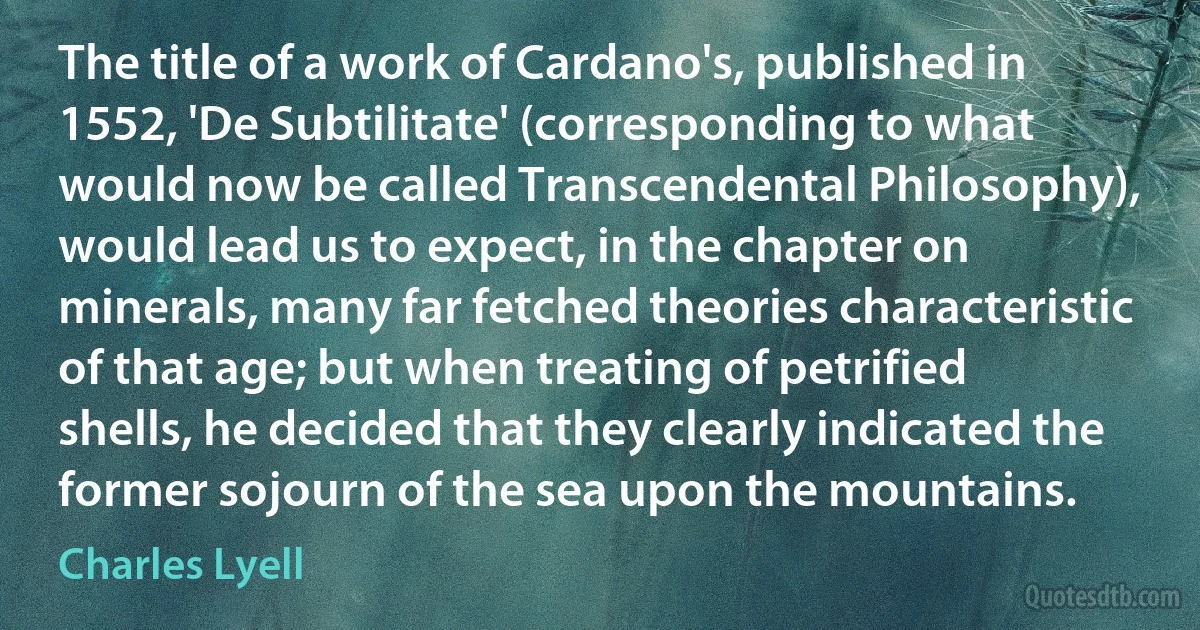Transcendental Quotes - page 2
Although there is no difference between a devotee in śānta-rasa or dāsya-rasa, vātsalya-rasa or mādhurya-rasa, one can still make a comparative study of the intensity of love in these different transcendental positions. For example, it may be said that dāsya-rasa is better than śānta-rasa, yet transcendental love of God is there in both of them.

A. C. Bhaktivedanta Swami Prabhupada
Liberal philosophy, at this point, ceases to be empirical and British in order to become German and transcendental. Moral life, it now believes, is not the pursuit of liberty and happiness of all sorts by all sorts of different creatures; it is the development of a single spirit in all life through a series of necessary phases, each higher than the preceding one. No man, accordingly, can really or ultimately desire anything but what the best people desire. This is the principle of the higher snobbery; and in fact, all earnest liberals are higher snobs.

George Santayana
There is a distinguishing difference of meaning between Jesus and Christ. His given name was Jesus; his honorific title was "Christ." In his little human body called Jesus was born the vast Christ Consciousness, the omniscient Intelligence of God omnipresent in every part and particle of creation. This Consciousness is the "only begotten Son of God," so designated because it is the sole perfect reflection in creation of the Transcendental Absolute, Spirit or God the Father.
It was of that Infinite Consciousness, replete with the love and bliss of God, that Saint John spoke when he said: "As many as received him [the Christ Consciousness], to them gave he power to become the sons of God." Thus according to Jesus' own teaching as recorded by his most highly advanced apostle, John, all souls who become united with Christ Consciousness by intuitive Self-realization are rightly called sons of God....

Paramahansa Yogananda
God ~Since the remotest times, Mankind has always believed in something beyond human understanding, something transcendental that he idolized no matter whether there was question of personified or unpersonified conceptions of God. Anything man was unable to understand or to comprehend was imputed to the powers above such as his intuitive virtue admitted them. In this way, all the deities of mankind, good and evil ones (demons) have been born. As time went on, gods, angels, demiurges, demons and ghosts have been worshiped irrespective of their ever having been alive in reality or their having existed only in fancy.

Franz Bardon
I have been wanting to write to you for some time, but never have time, so absorbed I am in playing chess. I play night and day and nothing in the whole world interests me more than finding the right move... Nothing transcendental going on here – strikes [in Buenos Aires, where chess competitions were organized that year for not professionals] a lot of strikes, the people are on the move. Painting interests me less and less.

Marcel Duchamp
If there is to be any philosophy at all, this contradiction must be resolved – and the solution of this problem, or answer to the question: how can we think both of Presentations as conforming to objects, and objects as conforming to presentations? is, not the first, but the highest task of transcendental philosophy.

Friedrich Schelling
...by the term Hypnotism, or Nervous Sleep, I mean a peculiar condition of the nervous system, into which it may be thrown by artificial contrivance, and which differs, in several respects, from common sleep or the waking condition. I do not allege that this condition is induced through the transmission of a magnetic or occult influence from my body into that of my patients; nor do I profess, by my processes, to produce the higher [i.e., supernatural] phenomena of the Mesmerists. My pretensions are of a much more humble character, and are all consistent with generally admitted principles in physiological and psychological science. Hypnotism might therefore not inaptly be designated, Rational Mesmerism, in contra-distinction to the Transcendental Mesmerism of the Mesmerists.[ Braid, Observations on Trance or Human Hibernation, 1850, 'Preface.

James Braid
In the early 20th century, cosmological physics was returned to the edge of time, and the question: what ‘came before' the Big Bang? For cosmology no less than for transcendental philosophy - or even speculative theology - this ‘before' could not be precedence (in time), but only (non-spatial) outsideness, beyond singularity. It indicated a timeless non-place cryptically adjacent to time, and even inherent to it. The carefully demystified time of natural science, calculable, measurable, and continuous, now pointed beyond itself, re-activated at the edges.

Nick Land
Another explanation for the persistence of the paranormal, I submit, is due to the transcendental temptation. In my book by that name, I present the thesis that paranormal and religious phenomena have similar functions in human experience; they are expressions of a tendency to accept magical thinking. This temptation has such profound roots within human experience and culture that it constantly reasserts itself.

Paul Kurtz
Is not the reason of the confidence of the positive, critical, experimental scientists, and of the reverent attitude of the crowd towards their doctrines, still the same? At first it seems strange how the theory of evolution (which, like the redemption in theology, serves the majority as a popular expression of the whole new creed) can justify people in their injustice, and it seems as if the scientific theory dealt only with facts and did nothing but observe facts. But that only seems so. It seemed just the same in the case of theological doctrine: theology, it seemed, was only occupied with dogmas and had no relation to people's lives, and it seemed the same with regard to philosophy, which appeared to be occupied solely with transcendental reasonings. But that only seemed so. It was just the same with the Hegelian doctrine on a large scale and with the particular case of the Malthusian teaching.

Leo Tolstoy
The over-publicized bit about expression (or non-expression) was simply a way of saying that music is supra-personal and super-real and as such beyond verbal meanings and verbal descriptions. It was aimed against the notion that a piece of music is in reality a transcendental idea "expressed in terms of" music, with the reductio ad absurdum implication that exact sets of correlatives must exist between a composer's feelings and his notation. It was offhand and annoyingly incomplete, but even the stupider critics could have seen that it did not deny musical expressivity, but only the validity of a type of verbal statement about musical expressivity. I stand by the remark, incidentally, though today I would put it the other way around: music expresses itself.

Igor Stravinsky
I do not think the line of division runs between people with secular and those with transcendental creeds, but rather between people with a centralized and dominating zeal which may possibly lead to self-sacrifice and the sacrifice of others, without tolerance in principle, and people who are tolerant on principle, having perhaps some transcendental creed, or because they, as empiricists, see the multiplicity of all arguing.

Otto Neurath
O my Lord! Your holy name alone can render all benedictions upon the living being, and therefore You have hundreds and millions of names, like Krishna, Govinda, etc. In these transcendental names, You have invested all Your transcendental energies, and there is no hard and fast rule for chanting these holy names. O my Lord! You have so kindly made approach to You easy by Your holy names...

Chaitanya Mahaprabhu
The possibility for compassionate concern for others, which is present in all humans, is usually mixed with the sense of ego and so becomes confused with the need to satisfy one's own cravings for recognition and self-evaluation. The spontaneous compassion that arises when one is not caught in the habitual patterns - when one is not perfoming volitional actions out of karmic cause and effect - is not done with a sense of need for feedback from its recipient. It is the anxiety about feedback - the response of the other - that causes us tension and inhibition in our action. When action is done withouth the business-deal mentality, there can be relaxation. This is called supreme (or transcendental) generosity.

Francisco Varela



